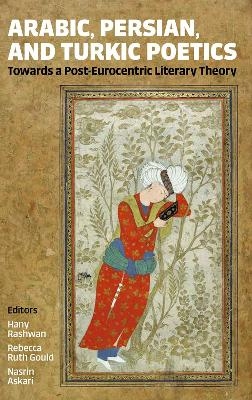
Arabic, Persian, and Turkic Poetics
Towards a Post-Eurocentric Literary Theory
Seiten
2024
Oxford University Press (Verlag)
978-0-19-726779-0 (ISBN)
Oxford University Press (Verlag)
978-0-19-726779-0 (ISBN)
- Noch nicht erschienen
- Versandkostenfrei
- Auch auf Rechnung
- Artikel merken
Drawing on the richness and depth of the literatures from the Islamicate world, Arabic, Persian, and Turkic Poetics: Towards a Post-Eurocentric Literary Theory paves the way for a more inclusive literary theory that is rooted in Arabic, Persian, and Turkic literary traditions and which fosters a deeper understanding of global literary discourse.
Arabic, Persian, and Turkic Poetics: Towards a Post-Eurocentric Literary Theory is a pioneering book that offers a fresh perspective on Arabic, Persian, and Turkic literature in their interrelations. The authors challenge Eurocentric paradigms while creating a framework for exploring these traditions on their own terms. Authored by an international team of scholars, each chapter centres the literary theoretical traditions of their respective literatures, with a focus on the discipline of comparative poetics ('ilm al-balāgha) in the Islamic world. By liberating the study of Islamicate literary texts from Eurocentric theoretical paradigms, the book paves the way for a more inclusive global discourse in literary studies. Specifically, our theoretical roots in comparative poetics and the rhetorical traditions of Arabic, Persian, and Turkic literatures will foster new methods of close reading that are in line with the aesthetic standards intrinsic to these texts and their traditions. Engaging and insightful, this book is essential reading for anyone interested in broadening their understanding of world literature and literary theory.
Arabic, Persian, and Turkic Poetics: Towards a Post-Eurocentric Literary Theory is a pioneering book that offers a fresh perspective on Arabic, Persian, and Turkic literature in their interrelations. The authors challenge Eurocentric paradigms while creating a framework for exploring these traditions on their own terms. Authored by an international team of scholars, each chapter centres the literary theoretical traditions of their respective literatures, with a focus on the discipline of comparative poetics ('ilm al-balāgha) in the Islamic world. By liberating the study of Islamicate literary texts from Eurocentric theoretical paradigms, the book paves the way for a more inclusive global discourse in literary studies. Specifically, our theoretical roots in comparative poetics and the rhetorical traditions of Arabic, Persian, and Turkic literatures will foster new methods of close reading that are in line with the aesthetic standards intrinsic to these texts and their traditions. Engaging and insightful, this book is essential reading for anyone interested in broadening their understanding of world literature and literary theory.
Dr Hany Rashwan is a scholar of Arabic and Comparative Poetics. He is an Assistant Professor of Arabic Language and Literature at UAE University as well as an Honorary Research Fellow at The University of Birmingham. Professor Rebecca Ruth Gould is a Distinguished Professor of Comparative Poetics and Global Politics, School of Oriental and African Studies (SOAS), University of London. Dr Nasrin Askari is a Research Fellow and Translator on the Persian segment of the European Research Council-funded project Global Literary Theory (GlobalLIT).
| Erscheint lt. Verlag | 14.11.2024 |
|---|---|
| Reihe/Serie | Proceedings of the British Academy ; 266 |
| Zusatzinfo | 1 b/w |
| Verlagsort | Oxford |
| Sprache | englisch |
| Maße | 156 x 234 mm |
| Themenwelt | Geisteswissenschaften ► Religion / Theologie ► Islam |
| Geisteswissenschaften ► Sprach- / Literaturwissenschaft ► Anglistik / Amerikanistik | |
| Geisteswissenschaften ► Sprach- / Literaturwissenschaft ► Literaturwissenschaft | |
| ISBN-10 | 0-19-726779-3 / 0197267793 |
| ISBN-13 | 978-0-19-726779-0 / 9780197267790 |
| Zustand | Neuware |
| Informationen gemäß Produktsicherheitsverordnung (GPSR) | |
| Haben Sie eine Frage zum Produkt? |
Mehr entdecken
aus dem Bereich
aus dem Bereich


